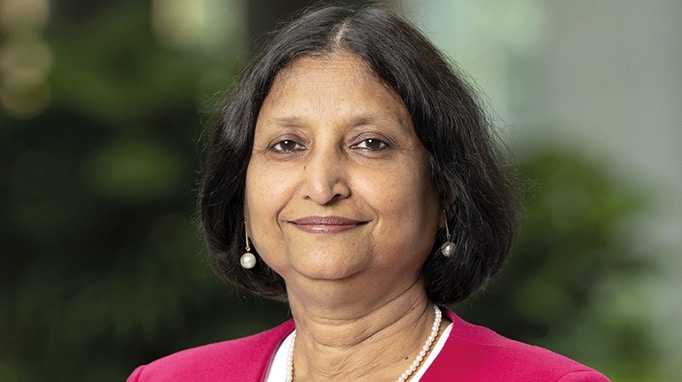World Bank MD and CFO Anshula Kant: Financing Where It Matters Most
Financing Where It Matters Most — People, The Planet, and the Role of Investors

Author: World Bank Managing Director and Chief Financial Officer Anshula Kant
Amid overlapping crisis facing the world, developing countries face the greatest risks as they are home to a great share of the world’s poor and most vulnerable, and those least able to adapt. These challenges are exacerbating poverty and inequality and stand to reverse decades of important and hard-won development gains in health, nutrition, education, and gender equality.
Stability and sustainability require a broad and holistic approach that includes financing and support from all corners to tackle the climate crisis, meet the urgent development needs of the vulnerable people living in poverty, and deliver the peace and prosperity that are at the heart of the Sustainable Development Goals. More and more investors are integrating environmental, social and governance (ESG) risks as part of their investment process, and some are actively looking for investment opportunities that support the SDGs and make a positive impact on society.
As the sustainable investment landscape develops, we must remain focused on facilitating sustainable financial flows to developing and emerging market countries.
The International Bank for Reconstruction and Development (IBRD), also known as “World Bank” is an international financial cooperative owned by 189 shareholding governments that leverages its equity to raise funds from private investors in the capital markets to finance loans to governments.
“Climate change touches almost all development indicators, including loss of lives and livelihoods, food and water insecurity, forced migration, and is threatening to push 132 million people into poverty over the next ten years.”
The World Bank is focused on ending extreme poverty and boosting shared prosperity, ensuring economic opportunities in society for everyone. The institution lends to developing countries at rates lower than they are able to obtain from the international markets and provides development expertise and knowledge-sharing as part of the package.
Through triple-A rated bonds, IBRD raises about USD 50 billion each year for lending to middle income countries. Another entity, the International Development Association (IDA) is a more recent entrant in the capital markets and now raises about USD 10 billion each year to supplement funds received from donors providing support to the poorest and most vulnerable lower income countries through grants and loans at highly concessional rates.
Climate Change is profoundly connected to the World Bank’s goals of sustainable development and human wellbeing. Climate change touches almost all development indicators, including loss of lives and livelihoods, food and water insecurity, forced migration, and is threatening to push 132 million people into poverty over the next ten years. Moreover, the poorest countries, having contributed the least to global greenhouse gas emissions, are especially vulnerable to the adverse impacts of climate change. Regardless of where they live, the poor and the vulnerable are suffering the most from climate change.
Applying a “whole of economy” approach with developing country clients helps the World Bank mainstream climate considerations across its portfolio. The approach focuses on policies and plans to create the right enabling environment for climate action and sustainable development pathways. If they are well designed and well implemented, the policies countries put in place for low-carbon and resilient growth could also help them address poverty and inequality.
Therefore, we help countries integrate climate considerations into their development strategies and deploy climate finance in ways that achieve the greatest impact for mitigation and adaptation. In short, we are weaving climate into all our decision making, not just for investments in sectors traditionally associated with climate, such as energy and transport, but also in health, education, and fiscal policy. Our investment decisions are made based on where they have the greatest positive impact.
For example, in Vietnam, working with the government, the World Bank released a Country Climate and Development Report to help the country balance its overall development and growth goals with climate risks. We found that without the right investments in adaptation and mitigation, climate change could cost the country 12 to 14.5 percent of their GDP per year by 2050 and plunge up to a million people into extreme poverty. However, there is now an opportunity to implement this whole of economy approach and put in place the right policies and strategies to decarbonise and achieve their net-zero ambition without reducing GDP growth.
This holistic approach can be applied not just to corporates, institutions, and economies. It can and should also be brought to the capital markets to make sure that all capital flows align to sustainable objectives.
There are three areas where the World Bank is helping to build sustainable capital markets to channel finance towards sustainable activities:
Firstly, the World Bank brought innovation to the climate finance space by issuing the first green bond in 2008 and we have gone further to label all our bonds as Sustainable Development Bonds. The World Bank’s first green bond catalysed investing for purpose and climate action in the capital markets. It helped set the standard for the market, and today we continue to play a key role in developing the necessary market infrastructure through our work on the Green Bond Principles and the Harmonized Framework for Impact Reporting. The “sustainability” label in our Sustainable Development Bonds, which is broader and more inclusive than simply green, not only reflects our global work in social and economic development and climate, but also the fact that all our bonds meet the strictest standards of sustainability, supporting positive impact around the globe.
Secondly, on disaster risk management, we are using our expertise and triple-A rating to issue catastrophe bonds, which are structured bonds that provide countries a tool to transfer disaster risk to the capital markets. Earthquakes, cyclones and hurricanes not only impact lives and essential infrastructure, but also require governments to be prepared to deliver funding quickly in times of need. In the past two decades, the World Bank has transferred USD 5 billion of catastrophe risk across more than 20 countries to the capital markets. Cat bonds are highly scalable and could become even more important in the future.
Last July, we helped Jamaica become the first Caribbean government and small island state to independently sponsor a cat bond. The USD 185 million bond will provide Jamaica financial protection against losses from named storms for three Atlantic tropical cyclone seasons ending in December 2023.
And thirdly, we are working closely with member countries to incorporate standards and transparency guidelines that will help them develop their own sustainable capital markets. Our efforts range from technical assistance on design and implementation of countries’ climate plans under the Paris Agreement to a range of policy advice and advisory work. Among others, we focus on the sovereign issuance of sustainable and thematic bonds, the development of green taxonomies, and green bond frameworks. Our advisory program has facilitated the development of green taxonomies in Colombia, and the issuance of sovereign and sub-sovereign green bonds by providing technical assistance in Egypt, Nigeria, Fiji, Philippines, and others and advisory work with Thailand and Malaysia’s public debt management offices for issuing Sustainability Bonds.
Organisations like the World Bank, together with governments and other public sector entities, cannot solve the massive challenges we are facing without the private sector.
Financial decisions need to be made based on where they matter most for people, for the planet, and with a shared purpose. A holistic viewpoint is critical for the emerging market and developing countries where we work. As accounting and disclosure guidelines, national green and social taxonomies and sustainable finance regulations are taking shape around the world, it will be critical that they do not have the unintended effect of steering private capital away from precisely the countries where it can have the greatest positive impact.
In all these approaches transparency is key – and while standardisation and harmonisation are welcome, country context needs to be included as a factor to help investors assess ESG risks. Lack of data, capacity, and resources in emerging market and developing countries make them different from developed country contexts and seemingly higher in terms of ESG risks, even when the positive impact of investments there are much greater.
We must get this right to ensure that sustainability standards and regulation will not have the unintended consequence of steering capital looking for sustainable options away from emerging market countries. Investments in emerging markets and developing countries may lack data, and some may have higher ESG risks than investment alternatives in developed countries. In many cases however, they make a much bigger positive impact on the people and the planet than comparable investments in developed countries.
Read the magazine version.
You may have an interest in also reading…
Grant Thornton UAE: A Defining Period for UAE Capital Markets
The economy of the United Arab Emirates (UAE) is set to grow at a significant pace in 2014 due to
Kristalina Georgieva, Managing Director of the IMF: Europe and the Global Recovery in 2021
We are at a point in our history where it is paramount to concentrate on what this crisis entails, what
Greece: The Primacy of Politics to Provide a Solution
Just a few years ago, Forbes Magazine – that self-proclaimed “Capitalist Tool” – identified the primacy of politics as the
















































































